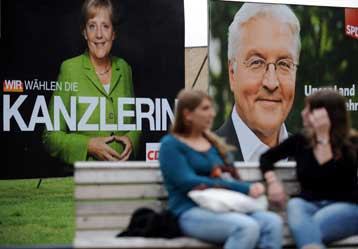Who are the World's Nuclear Powers ?
| | Sun,27 Sep |
* UNITED STATES: According to the counting rules in the Strategic Arms Reduction Treaty (START), as of Jan. 2009 the United States had an estimated 5,200 nuclear warheads and 2,700 operationally deployed warheads (2,200 strategic and 500 nonstrategic).
-- The May 2002 Treaty of Moscow (the Strategic Offensive Reductions Treaty, or SORT) between the United States and the Russian Federation, states both must reduce their deployed strategic nuclear forces to 1,700-2,200 warheads by 2012.
-- President Obama's "Prague Speech" in April 2009 committed the U.S. to the long-term goal of zero nuclear weapons. Obama said: "Today, I state clearly and with conviction America's commitment to seek the peace and security of a world without nuclear weapons.
* RUSSIA: Russia is estimated to have around 14,000 nuclear weapons, although the total is uncertain because there is no accurate count of tactical weapons. Under provisions of START I, the Russian nuclear arsenal has been reduced to around 4,138 strategic nuclear warheads, as of July 2008.
* FRANCE: France has been a party to the Treaty on the Non-Proliferation of Nuclear Weapons (NPT) since 1992. In 2008, President Nicolas Sarkozy announced the country would leave its submarine missile arsenal in place while cutting its stock of air-launched weapons by a third to around 290 warheads.
-- As of Sept. 2008, France had already pared down its arsenal to approximately 300 nuclear warheads.
* BRITAIN: Its nuclear stockpile consists of fewer than 200 strategic and "sub-strategic" warheads on four Vanguard-class nuclear-powered ballistic missile submarines.
* CHINA: China is estimated to have about 400 strategic and tactical nuclear weapons, and stocks of fissile material sufficient to produce a much larger arsenal. It acceded to the NPT in 1992 as a nuclear weapon state. China has pledged not to use nuclear weapons against non-nuclear weapons states.
Other "declared" nuclear nations
* NORTH KOREA:- North Korea tested its first nuclear explosive device in Oct. 2006 and its second in May 2009. Pyongyang withdrew from the NPT in Jan. 2003. North Korea has also conducted numerous missile tests.
-- Six-Party Talks between North Korea, South Korea, Japan, China, Russia, and the United States began in 2003 to quell North Korea's nuclear ambitions but broke down in 2005.
-- Talks resumed in 2007, and in June 2008 North Korea presented a list of its nuclear arms programs. However, North Korea said in April it would restart its nuclear plant that makes weapons-grade plutonium.
* INDIA: India has formally declared itself a nuclear weapon state. New Delhi is likely to have manufactured weapons-grade plutonium for at least 100 warheads. A 2007 report from the International Panel on Fissile Materials estimated 50-60 warheads had been assembled. Neither India nor Pakistan are signatories to the NPT.
* PAKISTAN: Pakistan is believed to have stockpiled approximately 580-800 kg of highly enriched uranium, sufficient amounts to build 30-50 fission bombs. According to the United States, China helped Pakistan by providing nuclear-related materials, scientific expertise and technical assistance. The Bulletin of the Atomic Scientists estimated in 2007 that the Pakistani arsenal comprised about 60 warheads.
Other undeclared nations
* ISRAEL: Israel is widely understood to possess a sizable nuclear arsenal but maintains a policy of nuclear ambiguity.
-- Based on estimates of the plutonium production capacity of the Dimona reactor, Israel has approximately 100-200 advanced nuclear explosive devices. Officially, Israel has declared that it will not be the first to introduce nuclear weapons into the Middle East. Israel has not signed the NPT treaty.
* IRAN: Iran has been a non-nuclear-weapon state party to the NPT since 1970. It has a uranium enrichment programmed which it says is geared to providing energy. Western powers suspect Iran is working to develop the means to make atomic bombs because of its past failure to declare nuclear facilities to the UN nuclear watchdog and continued restrictions on U.N. inspections. Iran is under UN sanctions for refusing to suspend the disputed activity.





